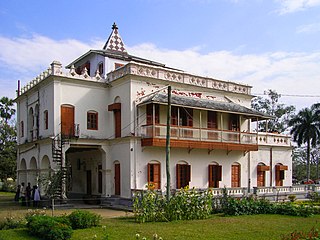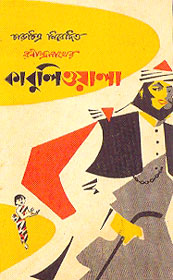Related Research Articles

Shantiniketan is a neighbourhood of Bolpur town in the Bolpur subdivision of Birbhum district in West Bengal, India, approximately 152 km north of Kolkata. It was established by Maharshi Devendranath Tagore, and later expanded by his son, Rabindranath Tagore whose vision became what is now a university town with the creation of Visva-Bharati.

Rituparno Ghosh was an Indian film director, actor, writer and lyricist. After pursuing a degree in economics, he started his career as a creative artist at an advertising agency. He received recognition for his second feature film Unishe April which won the National Film Award for Best Feature Film. Having won 19 National Awards, along with his contemporaries Aparna Sen and Goutam Ghose, Rituparno heralded contemporary Bengali cinema to greater heights. Ghosh died on 30 May 2013 in Kolkata after a heart attack. Ghosh was also one of the openly homosexual personalities in Indian cinema.

The works of Rabindranath Tagore consist of poems, novels, short stories, dramas, paintings, drawings, and music that Bengali poet and Brahmo philosopher Rabindranath Tagore created over his lifetime.

Rabindranath Tagore was an Indian poet, writer, playwright, composer, philosopher, social reformer, and painter during the age of Bengal Renaissance. He reshaped Bengali literature and music as well as Indian art with Contextual Modernism in the late 19th and early 20th centuries. Author of the "profoundly sensitive, fresh and beautiful" poetry of Gitanjali, he became in 1913 the first non-European and the first lyricist to win the Nobel Prize in Literature. Tagore's poetic songs were viewed as spiritual and mercurial; where his elegant prose and magical poetry were widely popular in the Indian subcontinent. He was a fellow of the Royal Asiatic Society. Referred to as "the Bard of Bengal", Tagore was known by sobriquets: Gurudeb, Kobiguru, and Biswokobi.

Kabuliwala is a 1957 Bengali film directed by Tapan Sinha and based on the eponymous 1892 short story by the Bengali writer Rabindranath Tagore.
Sombhu Mitra was an Indian film and stage actor, director, playwright, reciter and an Indian theatre personality, known especially for his involvement in Bengali theatre, where he is considered a pioneer. He remained associated with the Indian People's Theatre Association (IPTA) for a few years before founding the Bohurupee theatre group in Kolkata in 1948. He is most noted for films like Dharti Ke Lal (1946), Jagte Raho (1956), and his production of Rakta Karabi based on Rabindranath Tagore's play in 1954 and Chand Baniker Pala, his most noted play as a playwright.
The Tagore family has been one of the leading families of Kolkata, India, and is regarded as one of the key influencers during the Bengali Renaissance. The family has produced several people who have contributed substantially in the fields of business, social and religious reformation, literature, art and music.

Tapan Sinha was one of the most prominent Indian film directors of his time forming a legendary quartet with Satyajit Ray, Ritwik Ghatak and Mrinal Sen. He was primarily a Bengali filmmaker who worked both in Hindi cinema and Bengali cinema, directing films like Kabuliwala (1957), Louha-Kapat, Sagina Mahato (1970), Apanjan (1968), Kshudhita Pashan and children's film Safed Haathi (1978) and Aaj Ka Robinhood. Sinha started his career in 1946, as a sound engineer with New Theatres film production house in Kolkata, then in 1950 left for England where he worked at Pinewood Studios for next two years, before returning home to start his six decade long career in Indian cinema, making films in Bengali, Hindi and Oriya languages, straddling genres from social realism, family drama, labor rights, to children's fantasy films. He was one of the acclaimed filmmakers of Parallel Cinema movement of India.

Kabuliwala is a 1961 Hindi film based on the 1892 short story "Kabuliwala", by the Bengali writer Rabindranath Tagore. It was directed by Hemen Gupta and starred Balraj Sahni, Usha Kiran, Sajjan, Sonu and Baby Farida.

Amit Bose was an Indian filmmaker, film director and editor, who directed all-time classics like Abhilasha (1968) and, as an Editor, worked on movies like Madhumati (1958), Sujata (1959), Parakh (1960), Usne Kaha Tha (1960), Kabuliwala (1961), Prem Patra (1962), Bandini (1963) and Shakespeare Wallah (1965). He worked as Chief Film Editor for Bimal Roy and with several other directors including Sanjay Khan.

Noukadubi is a Bengali film directed by Rituparno Ghosh, released in January 2011. The movie is a period film set in the 1920s, based on a 1906 novel with the same name by Rabindranath Tagore, although the credits claim that the film is 'inspired' by the Tagore novel because Rituparno Ghosh has taken the skeleton of the original story and woven it with his own inputs – cerebral and emotional.
Dwijen Mukhopadhyay was an Indian composer and singer whose musical career spanned six decades. He was a performer of Rabindrasangeet, Bengali basic songs, Bengali and Hindi film songs. He recorded more than 1500 songs, of which about 800 are songs of Rabindranath Tagore. He also directed music in Bengali feature films and composed music for popular Bengali basic songs.
Kabuliwallah may refer to:

Stories by Rabindranath Tagore is a 2015 Indian Hindi television series which aired on the Epic channel. It is directed by Anurag Basu.
Gora is a novel by Rabindranath Tagore, set in Calcutta, in the 1880s during the British Raj. It is the fifth in order of writing and the longest of Tagore's twelve novels. It is rich in philosophical debate on politics and religion. Other themes include liberation, universalism, brotherhood, gender, feminism, caste, class, tradition versus modernity, urban elite versus rural peasants, colonial rule, nationalism and the Brahmo Samaj.
Below is a list of adaptations of works of Rabindranath Tagore in film and television.

Bioscopewala is an Indian Hindi-language drama film directed by Deb Medhekar, and produced by Sunil Doshi. The film stars Danny Denzongpa and Geetanjali Thapa in lead roles and had its world premiere at the 30th Tokyo International Film Festival on 28 October 2017. The film is an adaptation of Nobel Laureate Rabindranath Tagore's 1892 short story Kabuliwala and released on 25 May 2018 in India. The official trailer of the film was released on YouTube by Fox Star Studios on 8 May 2018. Bioscopewala has taken forward the timeline of Kabuliwala, the original story written by Rabindranath Tagore, from the 19th century to somewhere in the 1980s during the Taliban regime and changed the profession of Rehmat, the central character, from a dry fruit seller to a man who goes around showing films to children through his bioscope.
Kabuliwala is a drama film of 2006 directed by Kazi Hayat. It was based on "Kabuliwala", an 1892 short story written by Rabindranath Tagore. Kazi Hayat conducted the screenplay and dialogues. Faridur Reza Sagar and Ibn Hasan Khan jointly produced this film under the banner of Impress Telefilm Limited. Manna played the title role in this film as Rahmat. Dighi played the role of mini. Her real life parent Subrata Barua & Doyel, played the role of her father and mother in this film. It was the first time they acted together in a film.

Hemen Gupta was an Indian film director, producer and screenwriter in Hindi language films and Bengali language films.

Kabuliwala is a 2023 Indian Bengali-language directed by Suman Ghosh. Based on the 1892 short story "Kabuliwala" written by Rabindranath Tagore, the film stars Mithun Chakraborty, Anumegha Kahali, Abir Chatterjee and Sohini Sarkar in pivotal roles. It is produced by Shree Venkatesh Films and Jio Studios and the music is composed by Indraadip Dasgupta. It was released in theatres on 22 December 2023, on the occasion of Christmas.
References
- ↑ Radice, William (tr.), 1991. Selected Short Stories . pp. 295-302.
- ↑ Tagore, Rabindranath (2010). Chattopadhyay, Ratan Kumar (ed.). Selections from Galpaguchchha (3 volumes). Orient Blackswan.[ permanent dead link ]
- ↑ Pothukuchi, Madhavi (10 August 2019). "Kabuliwala is the heart-rending childhood tale of innocence, love & fate". The Print . Retrieved 16 May 2021.
- ↑ Norris, Rachael (26 June 2020). "Places to Go Kabuliwala by Rabindranath Tagore". thereader.org. Retrieved 16 May 2021.
- ↑ Quayum, Mohammad Abdul (2 May 2009). "Kabuliwala". thereader.org. Retrieved 16 May 2021.
- ↑ Kabuliwala (2023) at IMDb
